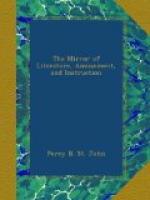than by the servile following of his bent, did not
give way only as the first did, but shaped his way
to those extremities for which himself was touched
with remorse at his death."[4] The means of exaction
chiefly consisted in the fines incurred by slumbering
laws, in commuting for money other penalties which
fell on unknown offenders, and in the sale of pardons
and amnesties. Every revolt was a fruitful source
of profit. When the great confiscations had ceased,
much remained to be gleaned by true or false imputations
of participation in treason. To be a dweller
in a disaffected district, was, for the purposes of
the king’s treasure, to be a rebel. No
man could be sure that he had not incurred mulcts,
or other grievous penalties, by some of those numerous
laws which had so fallen into disuse by their frivolous
and vexatious nature as to strike before they warned.
It was often more prudent to compound by money, even
in false accusations, than to brave the rapacity and
resentment of the king and his tools. Of his chief
instruments, “Dudley was a man of good family,
eloquent, and one that could put hateful business
into good language; Empson, the son of a sieve-maker,
of Towcester, triumphed in his deeds, putting off
all other respects. They were privy counsellors
and lawyers, who turned law and justice into wormwood
and rapine."[5] They threw into prison every man whom
they could indict, and confined him, without any intention
to prosecute, till he ransomed himself. They
prosecuted the mayors and other magistrates of the
city of London, for pretended or trivial neglects of
duty, long after the time of the alleged offences;
subservient judges imposed enormous fines, and the
king imprisoned during his own life some of the contumacious
offenders. Alderman Hawes is said to have died
heartbroken by the terror and anguish of these proceedings.
[6] They imprisoned and fined juries who hesitated
to lend their aid when it was deemed convenient to
seek it. To these, Lord Bacon tells us, were added
“other courses fitter to be buried than repeated."[7]
Emboldened by long success, they at last disdained
to observe “the half face of justice,"[8]
but summoning the wealthy and timid before them in
private houses, “shuffled up” a summary
examination without a jury, and levied such exactions
as were measured only by the fears and fortunes of
their victims.—Mackintosh’s England,
Vol. 2.
[4] Bacon, iii. 409.
[5] Ibid. iii. 380.
[6] See examples in Bacon, iii.
[7] Bacon, iii. 382.
[8] E: Ibid. 381.
* * * * *
SPIRIT OF DISCOVERY.
THE COURSE OF THE NIGER.
The discovery of the termination of the course of the Niger, will be of the greatest importance to geography, to our political power, and to civilization.




